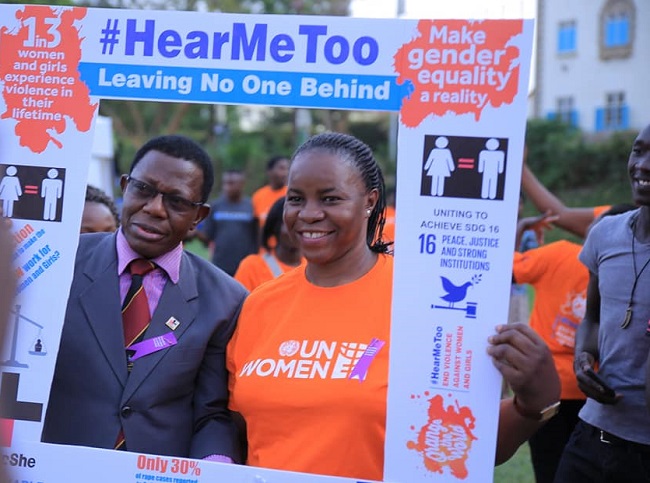Makerere University Academician and Ugandan human rights activist Prof. Sylvia Tamale has called upon Ugandans to embrace the values of Ubuntu in order to end Gender Based Violence and sexual harassment among communities.
“Growing up, my mother used to drum it into us to have obuntu bulamu… I want to therefore appeal to those values of humaneness, solidarity, interdependence, compassion, respect and dignity associated with Ubuntu. I want to appeal to your human goodness and sense of justice. I want to implore you to reject hierarchy and dominion based on gender, race, ethnicity, disability, age and so on,” she said
In a keynote address entitled Ubuntu: ending Gender based violence in institutions of higher learning and work places, Prof. Syliva Tamale, one of the leading African feminist lawyers and scholars in Africa said that there is need to instigate a spirit of togetherness and cooperation in communities in order to have free gender based societies.

The dialogue held on 30th November 2018 was one of the activities organised by the Makerere University Gender Mainstreaming Directorate in partnership with Communication for Development Foundation Uganda (CDFU); with financial support from UN Women during the international campaign of the 16 Days of Activism against Gender Based Violence (GBV).
Other activities included; an exhibition that ran from 29th – 30th November 2018, in the Makerere University Freedom Square, a session for students on Gender Based Violence conducted by Medical Doctors, Lawyers, and counsellors and signing up as HeForShe champions.
According to Prof. Tamale, Ubuntu is humaneness. it reflects the African understanding of diversity, solidarity, compassion, respect, dignity and the belief in a universal bond and sharing. She said that African traditional culture was not attuned to individual competition but to cooperating within community. The interests of the community were always placed above of those of the individual.
Reflecting on the theme of the day: Gender Based Violence prevention and responses, Prof. Tamale said that Gender Based violence is grounded in the hierarchy or social order that supports men’s dominance and superiority over women. It is based on a system of power called patriarchy and is driven by sexiest prejudices.

She mentioned that while men can and certainly do experience violence, the greatest majority of victims and survivors of gender based violence are women and girls.
“In other words our mothers, sisters, daughters, nieces, aunts and grandmothers are more likely to experience gender based violence in their lifetimes than will our fathers, brothers, sons, nephews, uncles, and grandfathers,” she stated.
She urged societies to adopt the values of Ubuntu to protect the weakest and most vulnerable person from undue arm.
Prof. Sylvia Tamale also proposed 10 key points on how to end gender based violence and these included;
- We all need to raise our consciousness and awareness to the different systems of intolerance of fellow human beings.
- We all need to educate ourselves on the root structural causes of gender based violence in order to nip the bud.
- Men, you need to rid yourselves of the false sense of superiority and entitlement over women.
- Women, we need to rid ourselves of the false sense of inferiority and deprivation.
- All of us need to stop objectifying women’s bodies.
- Women, we need to empower ourselves by speaking out and participating in decision making.
- Men, you need to empower yourselves by engaging with social justice and gender equity.
- Women, we need to liberate our minds from patriarchal thoughts that always put men first.
- We all need to tap into our essential goodness as human beings and treat others as we would have them treat us.
- We all need to return our African Spirituality of Ubuntu.
The program Specialist of UN Women-Uganda Ms. Susan Oregede acknowledged the tremendous role played by the young men to ensure that institutions of learning such as Makerere University are safe for women. She applauded Makerere University leadership for the bold action to fight against sexual harassment and called upon young women and men to participate and support the HeforShe campaign movement and the implementation of the sexual harassment policies in their respective institutions.
Representing the Makerere University Vice Chancellor Prof. Barnabas Nawangwe, the Director, Directorate of Research and Graduate Training Prof. Mukadasi Buyinza said that Makerere University has demonstrated strong commitment to end Gender Based Violence and its related practices.

“We have put in place a well-established Gender and Mainstreaming Directorate to mainstream gender in the University functions and propel the struggle for gender justice at Makerere University and beyond. Through the School of Women and Gender Studies, we have been able to address gender and development issues from an African perspective” he explained.
The Director of Makerere University Gender Mainstreaming Directorate Dr. Euzobia Mugisha Baine emphasised Makerere University’s zero tolerance to sexual harassment.
Mr. Oketcho Emanuel and Mr. Ocheng Ocheng, students from Makerere University and Kyambogo University respectively appealed to their fellow students to stand firm and fight against sexual harassment and gender based violence at universities.
“The actions start with us. While elders are talking and professors are writing books, let the youth and students act. That way we shall curb Gender Based Violence at Institutions of learning and workplaces,” said Mr. Ocheng.
Article by Mak Public Relations Office

 General2 weeks ago
General2 weeks ago
 Natural Sciences2 weeks ago
Natural Sciences2 weeks ago
 Agriculture & Environment1 week ago
Agriculture & Environment1 week ago
 Health2 weeks ago
Health2 weeks ago
 General5 days ago
General5 days ago






